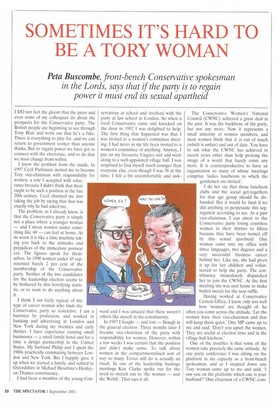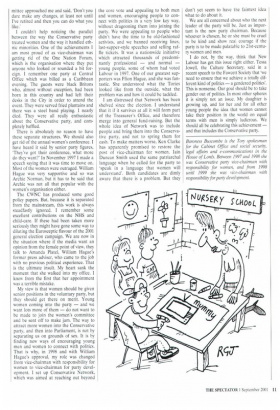SOMETIMES IT'S HARD TO BE A TORY WOMAN
Peta Buscombe, front-bench Conservative spokesman
in the Lords, says that if the party is to regain power it must end its sexual apartheid
I DO not feel the gloom that the press and even some of my colleagues do about the prospects for the Conservative party. The British people are beginning to see through Tony Blair and work out that he's a fake. There is everything to play for, and we can return to government sooner than anyone thinks. But to regain power we have got to connect with the electorate, and to do that we must change from within.
I know the problem from the inside. In 1997 Cecil Parkinson invited me to become Tory vice-chairman with responsibility for women, a role I accepted with reluctance because I didn't think that there ought to be such a position in the late 20th century. Cecil charmed me into taking the job by saying that that was exactly why he had asked me.
The problem, as I already knew, is that the Conservative party is simply not a place where a younger woman — and I mean women under something like 60 — can feel at home. At its worst it is like a time machine taking you back to the attitudes and prejudices of the immediate postwar era. The figures speak for themselves. In 1998 women under 45 represented barely 2 per cent of the membership of the Conservative party. Neither of the two candidates for the leadership election seems to be bothered by this horrifying statistic, or to want to do anything about it.
I think I am fairly typical of the type of career woman who finds the Conservative party so restrictive. I am a barrister by profession, and worked in banking and advertising in London and New York during my twenties and early thirties. I have experience running small businesses — a small family hotel and for a time a design partnership in the United States. My husband Philip and I spent the 1980s practically commuting between London and New York. But I happily gave it up when we started a family, and settled in Oxfordshire in Michael Heseltine's Henleyon-Thames constituency.
I had been a member of the young Con servatives at school and involved with the party at law school in London. So when a local Conservative came and knocked on the door in 1992 I was delighted to help. The first thing that happened was that I was invited to a women's committee meeting. I had never in my life been invited to a women's committee of anything. Anyway, I put on my favourite Ungaro suit and went along to a well-appointed village hall. I was surprised to find myself much younger than everyone else, even though I was 38 at the time. I felt a bit uncomfortable and awk
ward and I was amazed that there weren't others like myself in the constituency.
In 1997 I fought — and lost — Slough in the general election. Three months later I became vice-chairman of the party with responsibility for women. However, within a few weeks I was certain that the position just didn't make sense. To talk about women in the compartmentalised sort of way so many Tories still do is actually an insult. In one of the leadership hustings meetings Ken Clarke spoke out for the need to stretch out to 'the women — and the Welsh'. That says it all.
The Conservative Women's National Council (CWNC) achieved a great deal in the past. It was the backbone of the party, but not any more. Now it represents a small minority of women members, and most women think that it is out of touch (which is unfair) and out of date. You have to ask what the CWNC has achieved in recent years other than help prolong the image of a world that barely exists any more. It is counterproductive to have an organisation so many of whose meetings comprise 'ladies luncheons to which the gentlemen are invited..
I do not say that those luncheon clubs and the social get-togethers for that age group should be disbanded. But it would be fatal if we did anything to perpetuate this segregation according to sex. As a past vice-chairman, I can attest to the Conservative party losing countless women in their thirties to fifties because they have been turned off by this sexual apartheid. One woman came into my office with three languages, two degrees and a very successful business career behind her. Like me, she had given it up for her children and volunteered to help the party. The constituency immediately dispatched her to join the CWNC. At the first meeting she was sent home to make boiled sweets for the next raffle.
Having worked at Conservative Central Office, I know only too well how 'women' are thought of. So often you come across the attitude, 'Let the women have their vice-chairman and that will keep them quiet.' One MP came up to me and said, 'Don't you upset the women. They are useful at election time and in the village-hall kitchens.'
One of the troubles is that some of the women take precisely the same attitude. At one party conference I was sitting on the platform in my capacity as a front-bench spokesman, and as I stepped down one Tory woman came up to me and said, 'I saw you on the platform: which one is your husband?' One chairman of a CWNC com mittee approached me and said, 'Don't you dare make any changes, at least not until I've retired and then you can do what you like.'
I couldn't help noticing the parallel between the way the Conservative party treated women and the way it handled ethnic minorities. One of the achievements I am most proud of as vice-chairman was getting rid of the One Nation Forum, which is the organisation where they put anyone who looked or sounded a bit foreign. I remember one party at Central Office which was billed as a Caribbean evening. The guests were black Britons who, almost without exception, had been born in this country and had left their desks in the City in order to attend the event. They were served fried plantains and there was a steel band playing. I nearly died. They were all really enthusiastic about the Conservative party, and completely baffled.
There is absolutely no reason to have these separate structures. We should also get rid of the annual women's conference. I have heard it said by senior party figures, 'They've got their conference, what more do they want?' In November 1997 I made a speech saying that it was time to move on. Most of the women were outraged. William Hague was very supportive and so was Archie Norman, but it has to be said that Archie was not all that popular with the women's organisation either.
The CWNC has produced some good policy papers. But, because it is separated from the mainstream, this work is always steadfastly ignored. I remember some excellent contributions on the NHS and child-care. If these had been taken more seriously they might have gone some way to diluting the Eurosceptic flavour of the 2001 general election campaign. We are now in the situation where if the media want an opinion from the female point of view, they talk to Amanda Platel, William Hague's former press adviser, who came to the job with no previous political experience. That is the ultimate insult. My heart sank the moment that she walked into my office. I knew from the first that her appointment was a terrible mistake.
My view is that women should be given senior positions in the voluntary party, but they should get there on merit. Young women coming into the party — and we want lots more of them — do not want to be made to join the women's committee and be sent off to make jam. The way to attract more women into the Conservative party, and then into Parliament, is not by separating us on grounds of sex. It is by finding new ways of encouraging young men and women to connect with politics. That is why, in 1998 and with William Hague's approval, my role was changed from vice-chairman with responsibility for women to vice-chairman for party development. I set up Conservative Network, which was aimed at reaching out beyond the core vote and appealing to both men and women, encouraging people to connect with politics in a very low key way, without dragooning them into joining the party. We were appealing to people who didn't have the time to be old-fashioned activists, and we banned receiving lines, last-supper-style speeches and selling raffle tickets. It was a nationwide initiative which attracted thousands of predominantly professional — and normal — young people, some of whom had voted Labour in 1997. One of our greatest supporters was Ffion Hague, and she was fantastic. She understood what the Tories looked like from the outside, what the problem was and how it could be tackled.
I am distressed that Network has been shelved since the election. I understand that it if it survives at all it will form part of the Treasurer's Office, and therefore merge into general fund-raising. But the whole idea of Network was to include people and bring them into the Conservative party, and not to spring them for cash. To make matters worse, Ken Clarke has apparently promised to restore the post of vice-chairman for women. lain Duncan Smith used the same patriarchal language when he called for the party to 'speak in a language that women will understand'. Both candidates are dimly aware that there is a problem. But they don't yet seem to have the faintest idea what to do about it.
We are all concerned about who the next leader of the party will be. Just as important is the new party chairman. Because whoever is chosen, he or she must be cruel to be kind and show real courage if the party is to be made palatable to 21st-century women and men.
I do not, by the way, think that New Labour has got this issue right either. Tessa Jowell, the Culture Secretary, said in a recent speech to the Fawcett Society that we need to ensure that we achieve a totally different kind of politics — a gendered politics'. This is nonsense. Our goal should be to take gender out of politics. In most other spheres it is simply not an issue. My daughter is growing up, and for her and for all other young people the idea that women cannot take their position in the world on equal terms with men is simply ludicrous. We should all be celebrating this achievement — and that includes the Conservative party.
Baroness Buscombe is the Tory spokesman for the Cabinet Office and social security, legal affairs and e-communications in the House of Lords. Between 1997 and 1998 she was Conservative party vice-chairman with responsibility for women, and from 1998 until 1999 she was vice-chairman with responsibility for party development.



























































 Previous page
Previous page